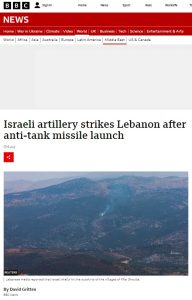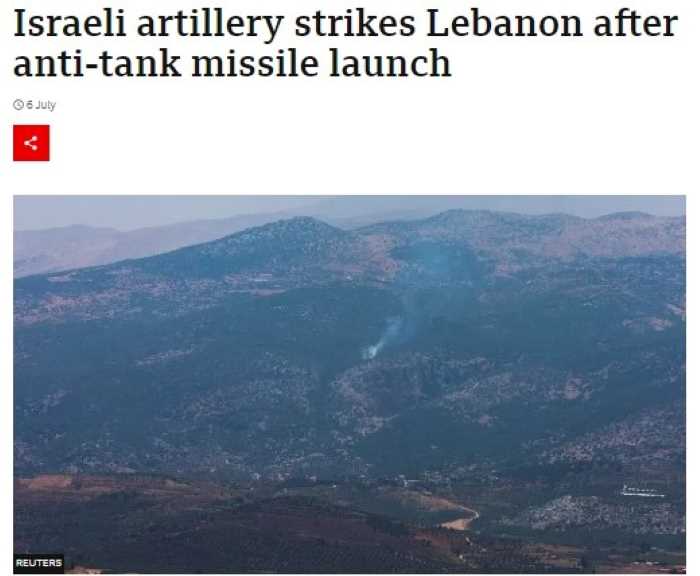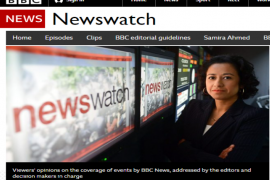On July 6th the BBC News website published a report by David Gritten under the ‘last first’ headline ‘Israeli artillery strikes Lebanon after anti-tank missile launch’.
The report opens with an accurate account of the story:
“Israel’s military says it responded with artillery fire after an anti-tank missile was launched from Lebanon.
Some of the missile’s parts “fell in Lebanon and some parts fell adjacent to the fence in the town of Ghajar in Israeli territory”, a statement said.”
However, the article goes on to promote conflicting and confusing information from Lebanese sources and makes several references to the village of Ghajar together with a link to a BBC report from 2010.
“Security sources in Lebanon told Reuters news agency that two rockets – rather than an anti-tank misile [sic] – were fired towards Israel.
The sources said one landed in Lebanese territory and the other near Ghajar, a contested town which straddles the frontier between Lebanon and the Israeli-occupied Syrian Golan Heights.
The Israeli military initially said that a rocket “exploded adjacent to the Blue Line in Israeli territory”, referring to the UN-demarcated frontier between the states.
But it later said that after assessing the shrapnel the projectile was identified as an anti-tank missile, and that some of its parts had fallen inside Israeli territory near Ghajar.
Israel currently occupies both halves of Ghajar and was supposed to have withdrawn from the Lebanese half under the UN Security Council resolution that ended the 2006 war.
Hezbollah has not commented on the rocket fire. But on Thursday morning the Iran-backed group issued a statement condemning the “serious measures” recently taken by Israeli forces in Ghajar, including “the erection of a barbed wire and the construction of a cement wall surrounding the entire town”.”
Gritten does not inform his readers that the village of Ghajar was part of the Syria-controlled Golan Heights (as the Alawite ethnicity of its inhabitants testifies) until 1967. During the years in which Israel controlled southern Lebanon following the 1982 war, the northern part of the village expanded into Lebanese territory. When Israel withdrew from southern Lebanon in 2000, the UN drew the ‘Blue Line’ marking the border right through the middle of the village without consulting its residents, who are Israeli citizens.
For years Ghajar was a closed military zone. Frequent smuggling of weapons and drugs from Lebanon into Israel via Ghajar prompted the recent construction of a fence around the northern part of the village, after which it was reopened to the general public.
Towards the end of Gritten’s report readers find a brief reference to a story from June which was not previously covered by the BBC:
“Last month, Israel filed a complaint with the UN saying that Hezbollah had erected two tents a few metres over the frontier on Israeli land in the area.”
Readers are not informed that the UN confirmed that the Lebanese terrorist organisation had indeed set up two tents (one of which was later dismantled) on Israeli territory.
Notably, Gritten’s report makes no mention whatsoever of UNSC resolution 1701 and the fact that according to that resolution, Hizballah operatives are not supposed to be anywhere near the border with Israel. His avoidance of the topic of the UNSC resolution which brought the 2006 war to an end enables Gritten to refer to and quote UNIFIL without mentioning its long-standing failure to meet its mission of enforcing the terms of that resolution.
Since the appearance of Gritten’s report several additional provocations by Hizballah have taken place along the border.
On July 12th – the anniversary of the 2006 Second Lebanon war – an attempt was made to sabotage the border fence.
“In the more serious incident close to 1 p.m., about four Hezbollah suspects approached the security fence and attempted to sabotage it with explosives. They set off the explosives, which also reportedly wounded some of them, but failed to break through the fence.
Israeli soldiers immediately spotted the suspects and used nonlethal means to get them away from the fence. […]
A few hours later, in a separate and less serious incident, unidentified Lebanese suspects used fireworks and other means to try to engage or disrupt IDF forces. The IDF succeeded in removing them as well.”
On the same day, Hizballah activists started fires near the Israeli town of Metulla.
On July 15th a Lebanese MP led a group of people over the border in an incident similar to one which had taken place ten days earlier.
“A group of Lebanese, including a parliamentarian, crossed the border into Israeli sovereign territory on Saturday morning, before being chased back to Lebanon by the Israel Defense Forces who fired warning shots.
In a statement, the IDF said troops fired warning shots and used riot dispersal means after the group of some 18 people crossed the so-called Blue Line in the contested Mount Dov region. The group walked some 80 meters into Israeli territory but not did not breach Israel’s border barrier.
According to Ali Shoeib, a Hezbollah-affiliated correspondent, a group of journalists had joined MP Qassem Hashem, a member of the Arab Socialist Ba’ath Party in Lebanon, for a tour of the border area.”
On July 19th regional media outlets reported the start of construction of a road along the Blue Line. The following day a group of Lebanese approached the border near Kibbutz Yiftah and threw rocks and lit fires and on July 23rd suspects approached the border near Kibbutz Menara.
None of those incidents has been reported by the BBC, which has demonstrated little interest in the potential outcomes of – and possible reasons for – Hizballah’s recent attempts to raise tensions along the border. Given that the BBC – including its Beirut office – has serially avoided reporting provocations by the Hizballah front ‘Green Without Borders’ for years, that may not come as much of a surprise.






The BBC Middle East service publishes only incidents that are harmful to Israel – and this one obviously is considered not to fall into that category.
BBC journalists that report from the Middle East need to look at their own moral compasses and think about the intentional racism they are displaying for the world to see and read and recording it for future generations to read. There is no doubt it certainly makes a joke of their Royal Charter and their so called impartiality.
#defundthebbc